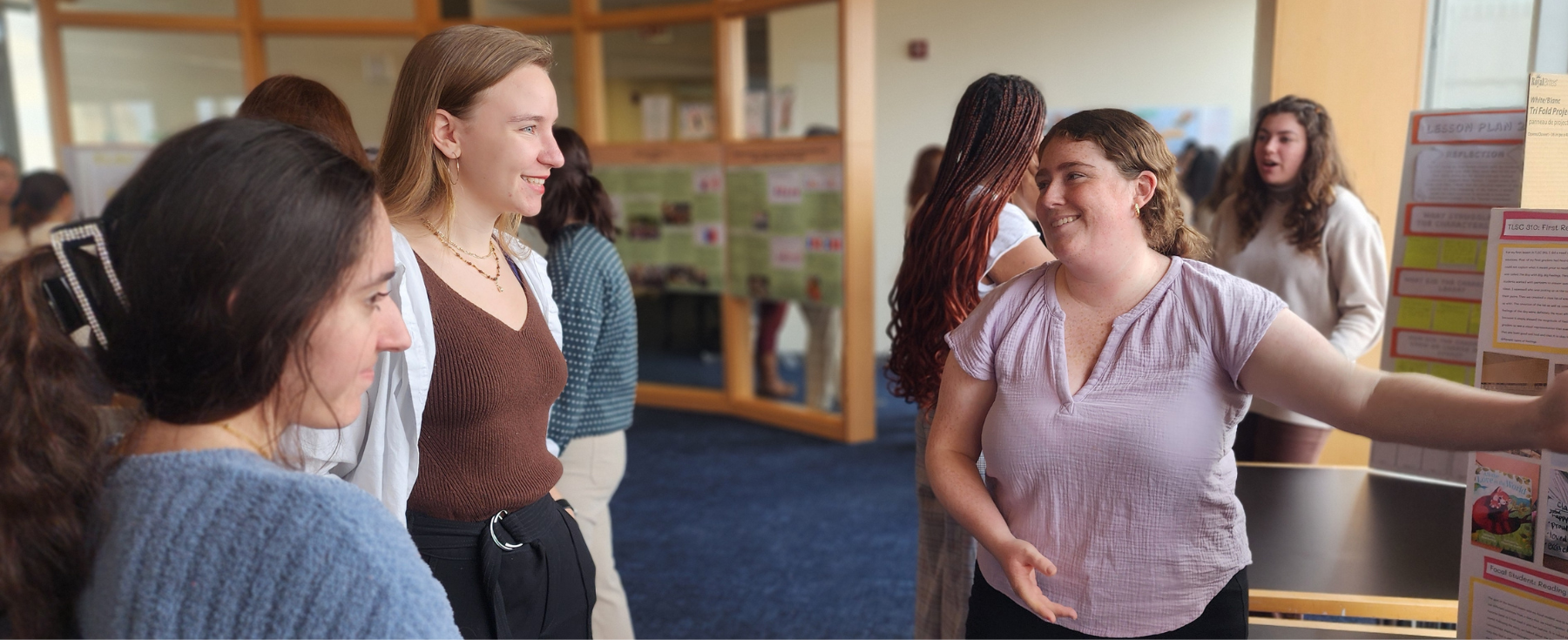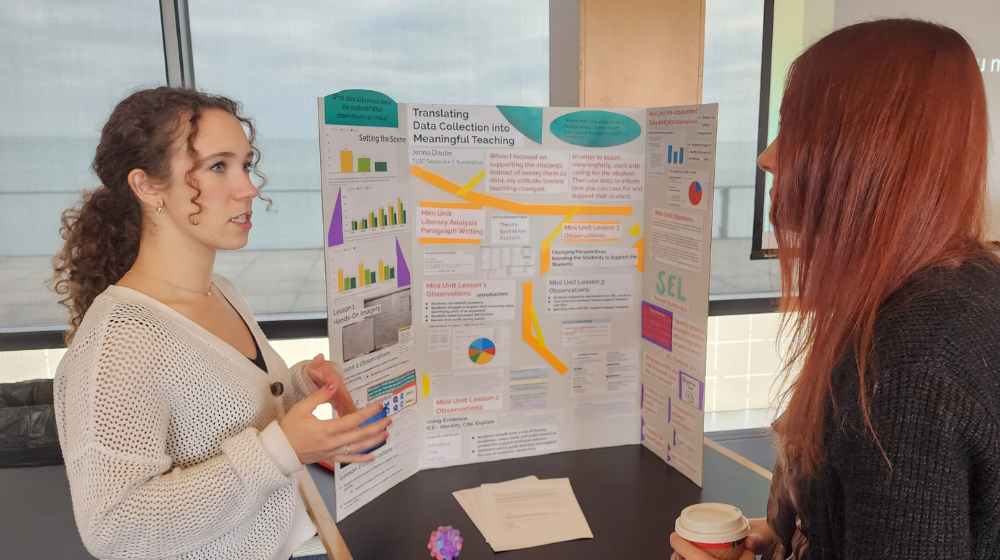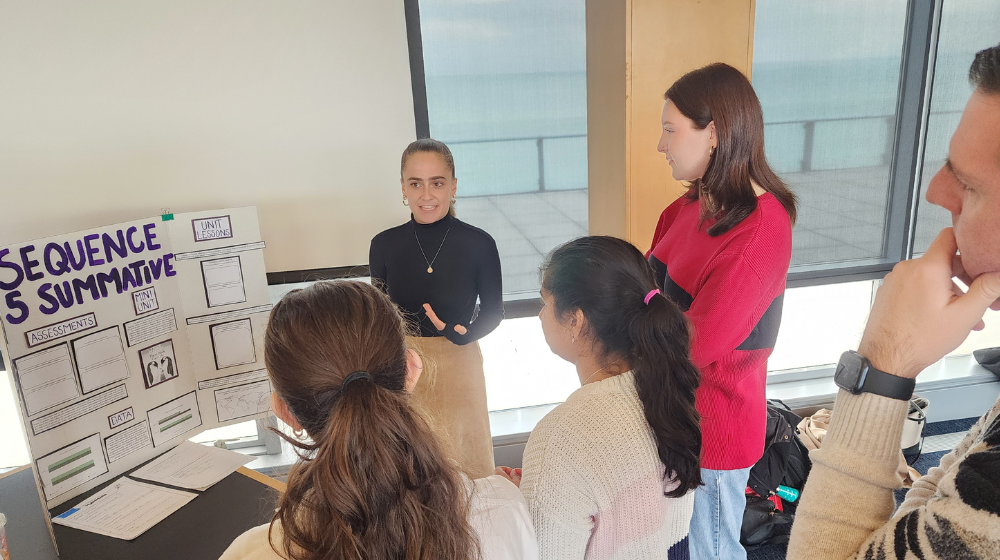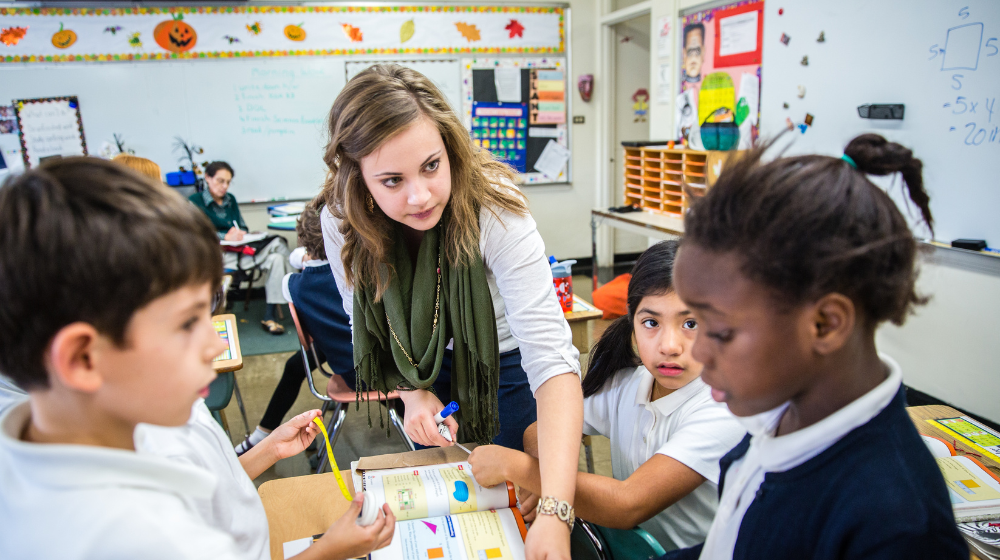
S5 Poster Session
Using Data to Lead in the Classroom
THE SEQUENCE 5 POSTER SESSION PREPARES FUTURE TEACHERS TO EXCEL
Learning through direct, hands-on experience boasts a wide variety of benefits for students. At the School of Education, faculty and staff recognize and promote these experiential learning opportunities and, in turn, encourage students to reflect on their education, collaborate with others, and hone their skills for their future careers.
Professor Dr. Aimee Ellis and Professor Dr. Adam Kennedy have carefully crafted an especially impactful immersive learning experience for teacher candidates at the School of Education through the Sequence 5 (S5) Poster Session.
“The S5 Poster Session is always an amazing event for faculty and teacher candidates,” Ellis said. “The candidates are able to see how the same basic assignments can be implemented across the birth through high school range. The candidates also get a chance to highlight their experiences throughout the semester, including ways they viewed and used data, how they incorporated language and literacy into instruction, and how they supported the diverse learning needs of all students.”

At the Sequence 5 Poster Session, students are able to share their work with their peers to highlight their findings and successes.
“As a future educator, the Sequence 5 Poster Session enabled us to see various perspectives on how to approach various lessons and allowed us to see how other teacher candidates created their lesson plans as well as what they found to be effective.” Jake Bartilad, Junior Elementary Education Undergraduate Student
In line with the School of Education’s vision, the S5 Poster Session inspires future educators to use education as a means for transformational experiences that will create a more just, equitable world. While immersed in the Chicagoland community, students will learn foundational knowledge and a strategic system-wide vision of data-based approaches to education.
After completing a course on Literacy Instruction and Data Use and spending 12 weeks on-site at various schools, students gather to share an overview of their recently accomplished hard work. This culminating project promotes collaboration and invites future teachers to view how the same assignments can vary in a wide range of learning spaces.
In today’s data-driven world, teachers commonly use various forms of data analysis to better understand their students' individualized needs. It is because of this that the School of Education recognizes the importance of preparing teacher candidates to employ the use of data in their work.
The assignments that students compare feature analyses of assessment data, the planning and teachings of a three-lesson mini-unit, and the integrations of literacy and content areas in the classroom. Allowing students to see how these assignments vary throughout learning environments on the birth-grade 12 spectrum inspires conversation, contemplation, and the necessary resources to make beneficial changes in education.
The skills learned throughout the S5 Poster Session process ready Loyola teacher candidates to lead a career that focuses their students at the center of education. Data is crucial for individualized and continuous learning, and the School of Education instills this in all future teachers. After the S5 Poster Session, students will have a strong understanding of how their work impacts classrooms and of the value of experiential learning.

The opportunity to share with peers invites students to reflect on what they've learned and think about how they can continue to grow as future educators.
Junior Ellie DeBock, a member of the School of Education’s Elementary Education program, appreciates the intriguing opportunities provided by the S5 Poster Session. In combination with her learning, DeBock was also able to express her creativity and reflect on her experiences in a meaningful way.
For DeBock, the S5 Poster Session provided her with hands-on learning that she can one day use in her classroom. “I not only enjoyed the process of organizing my information, but I also loved sharing it with my peers during the final poster session, which greatly improved my understanding of the content,” DeBock said. “The Sequence 5 final project engages teacher candidates in the process of self-reflection through conversations with others as well as promotes personal development and growth."
The School of Education’s unparalleled opportunities, including those provided in the S5 Poster Session, strengthen future teachers’ capabilities to one day provide their own students with inspirational, transformative educations of their own.

Degree Programs
Elementary Education
The School of Education's Elementary Education program prepares students with the only field-based curriculum in the country, allowing future educators to gain real-life experience in school settings beginning in their freshman year.
Learn MoreStory by Kate Roudebush
In line with the School of Education’s vision, the S5 Poster Session inspires future educators to use education as a means for transformational experiences that will create a more just, equitable world. While immersed in the Chicagoland community, students will learn foundational knowledge and a strategic system-wide vision of data-based approaches to education.
After completing a course on Literacy Instruction and Data Use and spending 12 weeks on-site at various schools, students gather to share an overview of their recently accomplished hard work. This culminating project promotes collaboration and invites future teachers to view how the same assignments can vary in a wide range of learning spaces.
In today’s data-driven world, teachers commonly use various forms of data analysis to better understand their students' individualized needs. It is because of this that the School of Education recognizes the importance of preparing teacher candidates to employ the use of data in their work.
The assignments that students compare feature analyses of assessment data, the planning and teachings of a three-lesson mini-unit, and the integrations of literacy and content areas in the classroom. Allowing students to see how these assignments vary throughout learning environments on the birth-grade 12 spectrum inspires conversation, contemplation, and the necessary resources to make beneficial changes in education.
The skills learned throughout the S5 Poster Session process ready Loyola teacher candidates to lead a career that focuses their students at the center of education. Data is crucial for individualized and continuous learning, and the School of Education instills this in all future teachers. After the S5 Poster Session, students will have a strong understanding of how their work impacts classrooms and of the value of experiential learning.
Junior Ellie DeBock, a member of the School of Education’s Elementary Education program, appreciates the intriguing opportunities provided by the S5 Poster Session. In combination with her learning, DeBock was also able to express her creativity and reflect on her experiences in a meaningful way.
For DeBock, the S5 Poster Session provided her with hands-on learning that she can one day use in her classroom. “I not only enjoyed the process of organizing my information, but I also loved sharing it with my peers during the final poster session, which greatly improved my understanding of the content,” DeBock said. “The Sequence 5 final project engages teacher candidates in the process of self-reflection through conversations with others as well as promotes personal development and growth."
The School of Education’s unparalleled opportunities, including those provided in the S5 Poster Session, strengthen future teachers’ capabilities to one day provide their own students with inspirational, transformative educations of their own.
